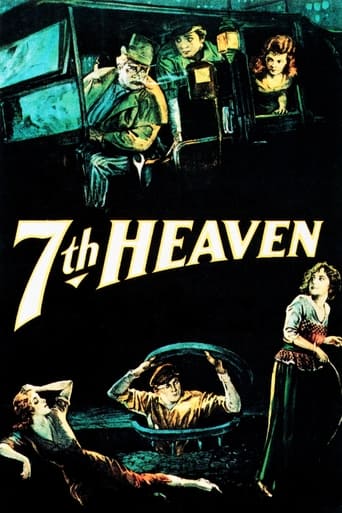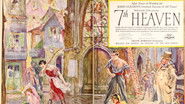anwarul210
Set in Paris, this is the story of Chico and Diane, how he picks her up out of the gutter and falls in love with her, how he goes to war and returns blinded but reunited. So, not much plot, cheesy at best and does not fill 110 minutes effectively. There is not much to keep the viewer interested in watching this incredibly dated movie, and the jarring war story that suddenly occurs without any foreshadowing did not perk up my interest.I do not understand the praise for Janet Gaynor in this movie as well as for 'Street Angel' and 'Sunrise: A Song Of Two Humans'. She constantly plays someone weak and frail, yet I felt no sympathy for her. If anything, I wanted to slap her into shape and tell her to grow a backbone. Charles Farrell overacts and gets worse in every scene to the point where he ends up as an arrogant poser. He is so irritating that you wish he died in the war rather than just being blinded.
Larry41OnEbay-2
SEVENTH HEAVEN, premiered May 6th of 1927, Produced by William Fox and distributed by Goldwyn Pictures.Here's an actual TRIVIA Pursuit question: Who preceded Judy Garland in the title role of the first film version of A Star Is Born? She is also the answer to another Trivial Pursuit question: who was the winner of the very first Academy Award as Best Actress, at the inaugural 1927-28 ceremony? And if that does not recommend the film enough to you, SEVENTH HEAVEN also received the most nominations of any film at the first Academy Awards ceremony, with five.The movie is a romance starring Janet Gaynor and Charles Farrell. Frank Borzage won the first Academy Award for Best Director and Benjamin Glazer won the first Oscar for Best Writing which was based on the play adaptation from the novel by Benjamin Harrison.Seventh Heaven is the 13th highest grossing silent film in cinema history, taking in more than $2.5 million at the box office in 1927.Seventh Heaven featured the song "Diane" by Erno Rapee and Lew Pollack, who wrote the song specifically for the film.A comparatively unknown remake of Seventh Heaven was produced as a sound film in 1937, starring Simone Simon, James Stewart, Jean Hersholt, and Gregory Ratoff, with Henry King directing.Some of you may recognize character actor George E. Stone in the beginning who usually played small gangsters in comic relief here playing a character called, "Sewer rat." Janet Gaynor with her big-eyed, small doll's face was a five foot tall actress known for her cleft chin and very expressive eyes. Six foot two, Charles Farrell could fill a room with his optimism and hope. Frank Borzage, a former actor directs with an intuitive sense of emotional temperature; he keeps things boiling under the surface while the screen only registers a simmer.Based on a long-running stage success and wildly popular upon its first release, SEVENTH HEAVEN is probably Frank Borzage's most famous film, the one where all his principles of mystical romance come together most distinctively. This exquisite tale of romance between street waif Diane (played by Janet Gaynor) and Paris sewage worker Chico (played by Charles Farrell) stresses the redemptive side of couplehood so persuasively that otherworldly connotations, like the strong ray of light that literally shines down on them after their various trials, seem only fair and natural. Borzage ennobles their poverty-stricken lives to such an extent that even the cruelties of war don't stand a chance when they are working against it together. It's the perfect exchange, lovers drawing strength from one another and ascending onto a different, metaphysical plane—you feel they could fly off the rooftops if they wanted to. Borzage patiently catches the smallest details of love, most memorably in the scene where Diane, alone in their garret, picks up Chico's coat and strokes it tenderly as if it were him. When the six-foot-two-inch Farrell kisses Gaynor passionately and holds her tiny five-foot frame up in the air, they truly look like a couple blessed by a winged divinity, with the space around them seemingly vibrating with some kind of spiritual presence. Watching them together in the same shot is an uncanny experience, one not easy to explain.His gift for transforming the mundane, commonplace world into something beautiful and dreamlike made the films of Frank Borzage extraordinary. 7th Heaven, and the heartbreaking performance of its star Janet Gaynor, virtually defined not only the Borzage style, but also Gaynor's screen image and to an even greater extent, romantic love in Hollywood. The story of a Paris waif, saved by a sewer worker who pities her, was so wildly successful Fox spent years trying to equal it. Nothing ever did. The pairing of Gaynor with handsome leading man Charles Farrell presented a couple so attractive, likable and with such genuine chemistry, the two would go on to appear in 12 films together, including two more with Borzage.Borzage's use of beautiful set design: the girls' decrepit home, the ancient cobblestone streets, Chico's rooftop garret and even the sewer, evoke an atmosphere that is both unreal and timeless. The ravishing sets created by Harry Oliver, whom Borzage used many times, add to the rich fairy-tale mood of a rather simple story, giving the characters an iconic quality.The acting may be a bit direct but in silent films they had to communicate more visually and sometimes it seemed over the top, but keep watching their eyes and you'll never loose the focus of the story. Film critic and historian Andrew Sarris described SEVENTH HEAVEN'S magic as "Borzage's commitment to love over probability." To some it's high schmaltz, really fever-pitched melodrama, and the plot relies on a huge number of coincidences. But it all works beautifully, through a perfect combination of acting, directing, and photography, not to mention the incredible lighting and set design. This is one of the great silent movies, and one of the great screen romances. Janet Gaynor had quite a year in 1927, turning in fantastic performances in this, as well as F. W. Murnau's Sunrise.
ackstasis
'Seventh Heaven (1927)' is usually compared to 'Sunrise: A Song of Two Humans (1927),' and not without reason. Director Frank Borzage has a keen sense for lighting and shot composition, perhaps not as effortlessly graceful as that of Murnau, but the film superbly explores three-dimensional space, most memorably in a vertical long take that follows the characters up seven floors of staircases, and a backwards tracking shot through the crowded trenches of a battlefield. Janet Gaynor, who also starred in 'Sunrise,' is once again a perfect picture of fragility and helplessness, a persona at which she was bettered only by Lillian Gish. More interesting, however, is that Gaynor's character undergoes a startling character arc, developing from a weak, embattled victim – a trampled flower – to a decisive and assertive woman, a member of the workforce, and an independent but devoted wife. Her husband, played by Charles Farrell, likewise undergoes a transformation, of the spiritual kind. Together, they share a love so definitive that the formula has since become familiar, but Borzage keeps it fresh.Perhaps the greatest miracle about 'Seventh Heaven' is that the romance works at all. Farrell's Chico is a haughty, athletic sewer worker, so determined of his own worth that he bores his grotesque colleagues with anecdotes of his future greatness. Gaynor's Diane, a small creature routinely lashed by her sleazy sister, is at first an object of derision for Chico, who uses her mere existence to affirm his atheism. Indeed, so aloof is his attitude towards her that I could scarcely believe that the pair were to fall in love, but the transition is carried out gradually and convincingly. As in most great romances, the two star-crossed lovers are swiftly separated by the onset of war. Here, once again, Borzage's keen eye for visual storytelling results in some wonderful sequences of conflict, with his portrayal of the battlefield perhaps serving as inspiration for Lewis Milestone's war drama 'All Quiet on the Western Front (1930).' Only with the occasional moments of misplaced comedy – the ritualistic bowing of the street-sweepers, for example – does the director fumble with the film's mood.This reviewer being an atheist, films dealing with a central religious theme face an uphill battle. Chico opens the film not unlike myself, as an obstinate atheist who curses God for failing to answer his prayers. Christianity intercedes through a kind-hearted priest, who offers Chico his dream-job as a street-sweeper, as well as two religious necklaces. Predictably, our hero is converted by the film's end, and, indeed, stages a resurrection that borders on Biblical. This "miraculous" ending could easily have had me rolling my eyes, but – somehow, and against all odds – it didn't. Borzage doesn't play Chico's survival as a startling revelation, and nor does it feel tacked-on, as does the fate of Murnau's hotel doorman in 'The Last Laugh (1924).' Alongside Diane's stubborn insistence that her husband is still alive, to actually see him pushing through the crowds seemed like the most natural thing in the world. And even if Chico is dead, then his wife is already there in Heaven, on the seventh floor, waiting to greet him.
sunlily
Well Janet Gaynor and Charles Farrell are a couple of "remarkable fellows" in this gem of a romance! They truly prove that heaven is where your heart is, even a 7th floor tenement in what is surely not the best part of Paris! Their chemistry together is remarkable and their love transcends time and space! Ah! Isn't that the way it's supposed to be? The fact that they compliment and lift each other up is the start of their romance. They bring out the best in each other. Not many movies today bring out the subtle nuances of character development the way they did in the old days! The secondary characters are fine in this too. I especially liked the rotund cab driver and his cab Eloise who gave her life for the war effort! And the married couple neighbors were a nice touch as well in rounding out the story.On a slightly critical note, I think the movie would have been better had not the soupy tints been added. I would've preferred it in black and white, but hey, the fact that the film still exists for generations to enjoy more that makes up for that! My Mom saw it too and she liked it as well! Not to be missed !





